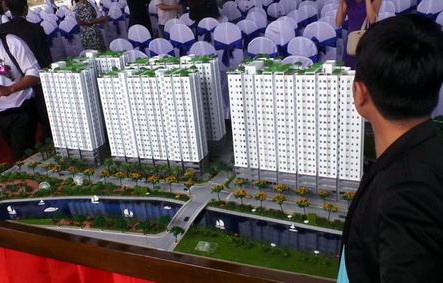Many banks are offering credit packages that allow homebuyers to borrow up to 70 percent of the value of the apartment they want to purchase, but there are risks behind these seemingly attractive lending plans.
When he was told about one such credit package, Le Van Lam eagerly visited several banks to learn more about a home loan that could help him buy a VND1.4 billion (US$65,895) apartment in Tan Phu District, Ho Chi Minh City.
Lam, who works for a construction material firm in the city, said he and his wife needed to borrow VND900 million ($42,361), as they had saved up VND500 million ($23,534).
Employees at one of the banks told Lam that he had three loan plans to choose from, all of which have a 15-year term.
The first plan offers a zero interest rate for the first month of the loan term, and two percent a year for the next 11 months. Starting from the second year, the lending interest will be the 13-month deposit interest rate at that time, plus a fixed 4 percent a year.
Under another plan, the loan would have a fixed 8 percent a year interest rate for the first six months, and then 12 percent a year for the next six months. The interest rate for the second year would be the 13-month deposit interest rate at that time, plus a fixed 5 percent a year.
This means if the deposit interest rate for a 13-month saving is 6.6 percent, the lending interest Lam would pay in the second year of his prospective loan would be 10.6 percent a year under the first plan, and 11.6 percent in the second one.
“What worried me was that we do not know how the deposit interest rates would change in the next 15 years,” Lam said.
The low interest rates of seven or eight percent are only applied for a short period of time, and it is dangerous that there are no fixed interest from that point on, he added.
Lam eventually decided to delay his plan to buy an apartment, fearing that he may “incur bankruptcy and lose the apartment” with such home loans.
Fifteen years of pressure
Taking out bank loans and amortizing the debt is the most feasible solution for people with decent income to be able to afford an apartment in Ho Chi Minh City.
But for Vo Ho Thuc Doan, choosing this solution means living under pressure for 15 years, thanks to the burden of clearing a loan.
The 32-year-old white-collar worker obtained a VND620 million ($29,182) home loan to buy a VND920 million ($43,302) apartment.
Since last December, Doan has had to pay around VND11 million ($518) a month to clear her debt.
“I have to set aside this amount every month, no matter what happens,” she said.
“As life is full of things we don’t expect, there were months when the payment date was near while I did not have enough money.”
Nguyen Khoa, a public servant in Ho Chi Minh City, was not able to withstand such pressure.
In 2010, Khoa had to put his apartment up for sale so he could repay the home loan he had borrowed for the property.
While he was able to pay VND10 million ($471) a month to clear the debt at 12 percent a year in 2008, the interest rate rose to 18 percent a year in 2010, thus doubling the monthly amount he had to pay.
“We had to sell our house, as we could not afford VND20 million ($942) a month,” he said.
Like us on Facebook or follow us on Twitter to get the latest news about Vietnam!


















































